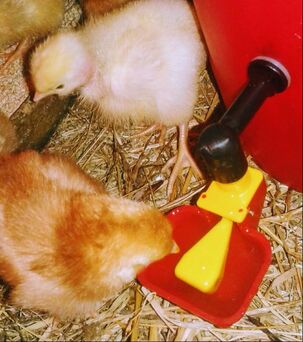 Baby chicks drinking from automatic water cup at CHOE
Baby chicks drinking from automatic water cup at CHOE
Baby Chick feeders should have small opening so your peeps can get to the feed easily and prevents them from standing in and defecating on their feed which can contaminate the feed and make the chicks sick.
Baby chick feeders should also be designed so that the chicks cannot crawl into the feeder. I have actually had this happen. I once used a small dog food feeder for my baby chicks and suddenly I heard all the chickens making a ruckus and when I went outside to see what was happening my baby chick was inside the feeder itself. If it had been a very hot day I would have lost the chick, so now I only use feeders designed for baby chicks.
Baby chicks do not need treats. Treats can prevent your chicks from getting the right amount of vitamins and nutrients they need for their growth process. If you buy a complete and balanced chick starter feed your baby chicks will have all of the nutrients and vitamins they need as long as their feed is kept in a cool dry place.
Make sure to clean feeders every other day to make sure that the feed has not clumped or gotten any feces in it. Baby chicks will hop on the feeder after a few days and can contaminate the feed. Make sure you use feeders appropriate for you birds age. Feeders designed for baby chicks will be quickly outgrown so be prepared to keep a larger feeder on hand for when they do.
Baby chick feeders should also be designed so that the chicks cannot crawl into the feeder. I have actually had this happen. I once used a small dog food feeder for my baby chicks and suddenly I heard all the chickens making a ruckus and when I went outside to see what was happening my baby chick was inside the feeder itself. If it had been a very hot day I would have lost the chick, so now I only use feeders designed for baby chicks.
Baby chicks do not need treats. Treats can prevent your chicks from getting the right amount of vitamins and nutrients they need for their growth process. If you buy a complete and balanced chick starter feed your baby chicks will have all of the nutrients and vitamins they need as long as their feed is kept in a cool dry place.
Make sure to clean feeders every other day to make sure that the feed has not clumped or gotten any feces in it. Baby chicks will hop on the feeder after a few days and can contaminate the feed. Make sure you use feeders appropriate for you birds age. Feeders designed for baby chicks will be quickly outgrown so be prepared to keep a larger feeder on hand for when they do.
Tips for feeding and watering baby chicks:
Keep baby chicks on commercial starter feed.
Do not give them treats. Treats can cause them to get diarrhea and even kill them.
Provide grit made for baby chicks to help them digest their food.
Store baby chick feed in a cool, dry place in a rodent proof container.
Put marbles or rocks in water dish to prevent baby chicks from drowning or use poultry cups with a built in float so baby chicks cannot jump into the water or poop in it, plus there is less chance of water getting spilled or you can put an automatic poultry water cup that stays full all the time on a plastic coffee can, poke tiny holes in the top to relieve pressure. Don't use poultry water cups that the chicks have to push on something to get the water out. Some chicks will not figure it out and will dehydrate very quickly.
Keep baby chicks on commercial starter feed.
Do not give them treats. Treats can cause them to get diarrhea and even kill them.
Provide grit made for baby chicks to help them digest their food.
Store baby chick feed in a cool, dry place in a rodent proof container.
Put marbles or rocks in water dish to prevent baby chicks from drowning or use poultry cups with a built in float so baby chicks cannot jump into the water or poop in it, plus there is less chance of water getting spilled or you can put an automatic poultry water cup that stays full all the time on a plastic coffee can, poke tiny holes in the top to relieve pressure. Don't use poultry water cups that the chicks have to push on something to get the water out. Some chicks will not figure it out and will dehydrate very quickly.
References:
Chicken, hen, poultry and animal HD photo by Michael Anfang (@manfang) on Unsplash. (2019). Unsplash.com. Retrieved 24 February 2019, from https://unsplash.com/photos/LAVcmB1Gli0
Chicken, hen, poultry and animal HD photo by Michael Anfang (@manfang) on Unsplash. (2019). Unsplash.com. Retrieved 24 February 2019, from https://unsplash.com/photos/LAVcmB1Gli0

